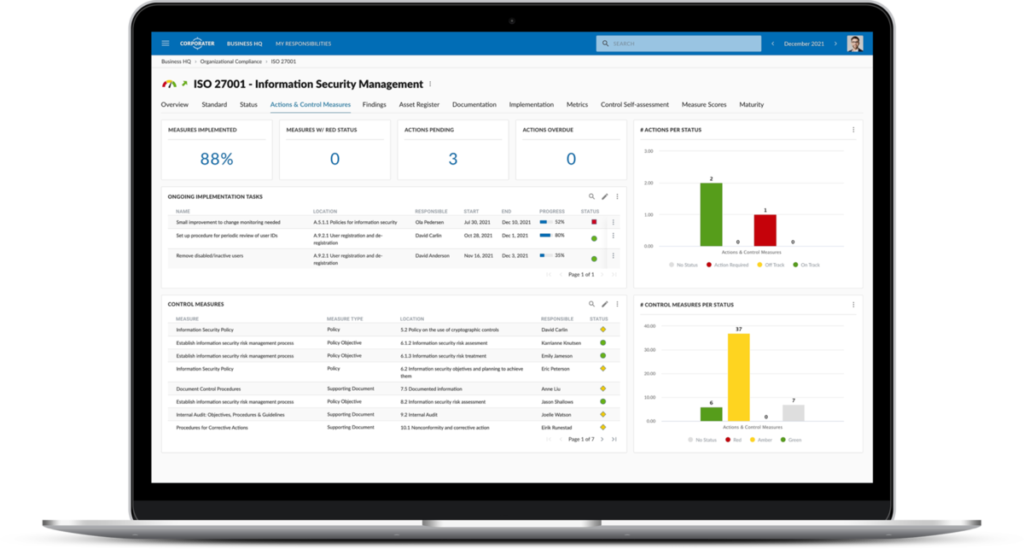
Compliance Software,In today’s complex business environment, companies face increasing pressure to adhere to a wide array of regulations, standards, and industry requirements. Non-compliance can result in severe legal and financial consequences, along with reputational damage. This has led many businesses to adopt compliance software as a way to manage, monitor, and ensure adherence to these diverse rules and regulations.
Compliance software, designed to simplify and streamline compliance tasks, has become a crucial tool in safeguarding organizations from potential risks. In this article, we will explore what compliance software is, its benefits, key features, types of compliance software, and why adopting this technology is no longer just a good practice but a strategic necessity for businesses of all sizes.
What is Compliance Software?
It refers to a suite of tools, systems, and platforms used by organizations to manage compliance with various regulations, standards, and laws. These regulations could be related to financial reporting, data privacy, environmental practices, cybersecurity, labor laws, anti-corruption measures, and more. The software helps businesses ensure that their operations align with legal requirements, industry standards, and internal policies.
For organizations dealing with multiple jurisdictions, industries, or markets, compliance software becomes an invaluable asset by providing automated solutions for managing regulatory obligations. With the software’s capabilities, businesses can maintain up-to-date knowledge of the regulations that affect them, monitor compliance in real-time, and generate necessary reports for audits and regulatory checks.
The Importance of Compliance in the Modern Business Landscape
Compliance is a fundamental aspect of business operations, regardless of the industry or geographical location. Here are a few reasons why compliance is so important:
Regulatory Scrutiny
Governments and regulatory bodies around the world have become more stringent in enforcing regulations. Non-compliance can lead to hefty fines, penalties, and even business shutdowns. For example, violations of data privacy regulations such as GDPR (General Data Protection Regulation) in the European Union can result in fines of up to 4% of annual revenue.
Risk Mitigation
Failure to comply with industry standards and regulations can expose a company to financial, legal, and reputational risks. Compliance software helps identify and mitigate these risks by providing real-time monitoring and auditing capabilities.
Reputation Management
Companies that consistently meet compliance standards gain trust among customers, investors, and other stakeholders. A good reputation for compliance helps foster long-term business relationships and customer loyalty.
Internal Efficiency
Compliance software helps automate manual compliance processes, reducing the workload on employees, minimizing human error, and allowing companies to focus on their core business objectives.
Global Expansion
For businesses that operate internationally, compliance software is crucial in navigating the varying regulatory landscapes across countries. It enables businesses to ensure they comply with local regulations, tax laws, and industry-specific requirements in each region.
Key Features of Compliance Software
Compliance software comes with a wide range of features designed to address the diverse needs of different organizations. Some of the most common features include:
Automated Compliance Tracking
Compliance software can automatically track regulatory changes and update businesses on any new or amended laws that may affect their operations. This automation reduces the need for manual tracking and ensures businesses stay up-to-date with minimal effort.
Document Management and Storage
Compliance requires significant documentation, from policies and procedures to audit trails and regulatory reports. A robust compliance software system provides secure storage and efficient management of all necessary documents, ensuring easy retrieval and sharing during audits.
Audit Trails
An essential feature for industries that require detailed record-keeping, audit trails allow businesses to track who accessed or modified particular documents, when, and why. This ensures transparency and accountability within the organization.
Risk Management Tools
Risk management features help businesses assess, prioritize, and manage risks associated with non-compliance. These tools allow companies to identify potential vulnerabilities, take corrective actions, and implement mitigation strategies.
Reporting and Analytics
Compliance software generates detailed reports that are crucial for internal assessments, audits, and external regulatory bodies. These reports can provide insights into compliance levels across departments, identify areas of concern, and facilitate continuous improvement.
Policy Management
Many industries require businesses to develop, distribute, and enforce internal policies to ensure regulatory compliance. Compliance software helps create, distribute, and track the effectiveness of these policies.
Incident Management
In case of non-compliance incidents or regulatory violations, compliance software often features tools to report, investigate, and address such issues. This could include automated alerts, case management workflows, and resolution tracking.
Types of Compliance Software
Compliance software comes in many forms depending on the industry, regulatory needs, and specific business requirements. Some of the most common types of compliance software include:
Governance, Risk, and Compliance (GRC) Software
GRC software is designed to help organizations manage governance, risk, and compliance processes across the enterprise. It provides integrated solutions for tracking risks, monitoring internal controls, and ensuring regulatory compliance across different departments.
Environmental
Environmental regulations are increasingly important as organizations must adhere to laws related to environmental protection, waste management, energy consumption, and emissions. Environmental compliance software helps businesses track, manage, and report on these obligations.
Data Privacy and Security
With the growing concerns over data breaches and privacy violations, especially with regulations such as GDPR and CCPA (California Consumer Privacy Act), data privacy compliance software assists businesses in managing and protecting sensitive customer data, ensuring they meet security requirements.
Financial and Accounting
In the financial services industry, compliance with accounting standards, tax laws, and anti-money laundering regulations is critical. Financial compliance software helps organizations ensure they comply with legal and regulatory requirements related to financial reporting, auditing, and tax filings.
Health Care
Healthcare organizations must comply with numerous regulations such as HIPAA (Health Insurance Portability and Accountability Act) in the U.S. Healthcare compliance software is designed to help manage patient data privacy, billing practices, accreditation, and quality assurance standards.
ISO Certification
Businesses that aim to achieve ISO (International Organization for Standardization) certifications need to comply with specific international standards. ISO compliance software helps manage processes, audits, and documentation required for certification.
Benefits of Using
The use of compliance software offers numerous benefits for organizations of all sizes. Here are some of the key advantages:
Improved Efficiency and Productivity
By automating compliance tasks and reducing manual processes, compliance software frees up employees from administrative duties, allowing them to focus on higher-value tasks. Automation helps prevent errors, reduces the time spent on compliance tasks, and minimizes the risk of human oversight.
Cost Reduction
Non-compliance can result in expensive fines, legal fees, and even business closures. By ensuring adherence to regulations, compliance software reduces the likelihood of costly penalties. Additionally, the time and resources saved by automating compliance processes can also lead to cost savings.
Real-Time Monitoring
With compliance software, businesses can monitor compliance in real time, ensuring that any potential issues are identified early on. This helps to address problems proactively, rather than reactively during audits or regulatory investigations.
Streamlined Audits
It,makes the audit process easier by maintaining organized records, generating audit reports, and tracking past compliance activities. This reduces the time and effort required during external or internal audits.
Scalability
As organizations grow and expand, compliance requirements tend to become more complex. Compliance software can scale with your business, helping to manage new regulations and jurisdictions as the company grows.
Conclusion
As regulations continue to evolve and become more complex, the role of it will only become more critical. In the future, we can expect further automation, enhanced integration with other business systems (such as ERP and HR software), and the use of artificial intelligence and machine learning to predict regulatory trends and risks.
For businesses today, compliance software is no longer an optional tool—it’s a necessity for managing risk, improving efficiency, and ensuring long-term sustainability in an increasingly regulated world. By adopting comprehensive compliance software, businesses can reduce operational risks, improve their reputation, and navigate the regulatory landscape with confidence.
In a rapidly changing regulatory environment, embracing compliance software is not just about avoiding penalties—it’s about proactively fostering a culture of compliance that drives long-term success and growth.
Also Read More About



